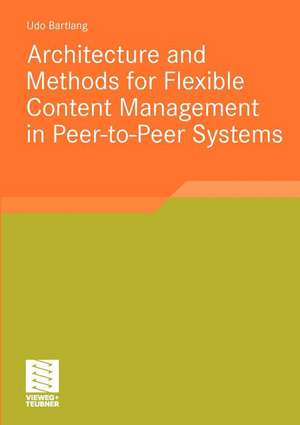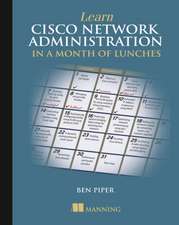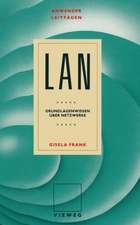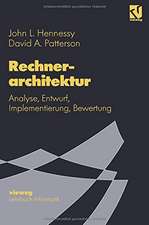Architecture and Methods for Flexible Content Management in Peer-to-Peer Systems
Autor Udo Bartlangen Limba Engleză Paperback – 24 feb 2010
Preț: 640.84 lei
Preț vechi: 801.05 lei
-20% Nou
Puncte Express: 961
Preț estimativ în valută:
122.64€ • 127.57$ • 101.25£
122.64€ • 127.57$ • 101.25£
Carte tipărită la comandă
Livrare economică 14-28 aprilie
Preluare comenzi: 021 569.72.76
Specificații
ISBN-13: 9783834810236
ISBN-10: 3834810231
Pagini: 240
Ilustrații: 240 p. 65 illus.
Dimensiuni: 148 x 210 x 22 mm
Greutate: 0.29 kg
Ediția:2010
Editura: Vieweg+Teubner Verlag
Colecția Vieweg+Teubner Verlag
Locul publicării:Wiesbaden, Germany
ISBN-10: 3834810231
Pagini: 240
Ilustrații: 240 p. 65 illus.
Dimensiuni: 148 x 210 x 22 mm
Greutate: 0.29 kg
Ediția:2010
Editura: Vieweg+Teubner Verlag
Colecția Vieweg+Teubner Verlag
Locul publicării:Wiesbaden, Germany
Public țintă
ResearchCuprins
Background.- Analysis of Content Repository Requirements in a Peer–to–Peer Case.- Design of a Generic Peer–to–Peer Content Repository System Architecture.- Methods for Flexible Content Repository Functions in Structured Peer–to–Peer Overlays.- Methods for Flexible Content Repository Functions in Hybrid Peer–to–Peer Overlays.- Evaluation.- Conclusion and Outlook.
Notă biografică
Dr. Udo Bartlang completed his doctoral thesis at the Faculty of Mathematics/Computer Science and Mechanical Engineering (Department of Informatics, Business Information Technology Unit), Clausthal University of Technology. The thesis was conducted at Siemens Corporate Technology, Munich.
Textul de pe ultima copertă
The operation of dedicated content repositories is a change in perspective of content lifecycle management: their application largely promises both technical and financial benefits. Today, centrally managed static client-server architectures are the prevailing design approach for content repositories. Systems built according to this paradigm, however, inherently lack flexibility regarding the support of different content models and functional properties (e.g., dynamic reconfiguration) as well as non-functional aspects (e.g., scalability).
Udo Bartlang investigates the applicability of a decentralised approach based on the peer-to-peer architecture paradigm to overcome such drawbacks. Considering the implementation of content repository functions, he presents an architecture and methods to enable flexible content management in peer-to-peer systems (e.g., given consistency issues with regard to concurrent data operations in a dynamically changing network environment): the introduced (generic) solutions narrow the trade-off between requirements of content repositories and inherent properties of peer-to-peer systems.
Udo Bartlang investigates the applicability of a decentralised approach based on the peer-to-peer architecture paradigm to overcome such drawbacks. Considering the implementation of content repository functions, he presents an architecture and methods to enable flexible content management in peer-to-peer systems (e.g., given consistency issues with regard to concurrent data operations in a dynamically changing network environment): the introduced (generic) solutions narrow the trade-off between requirements of content repositories and inherent properties of peer-to-peer systems.













